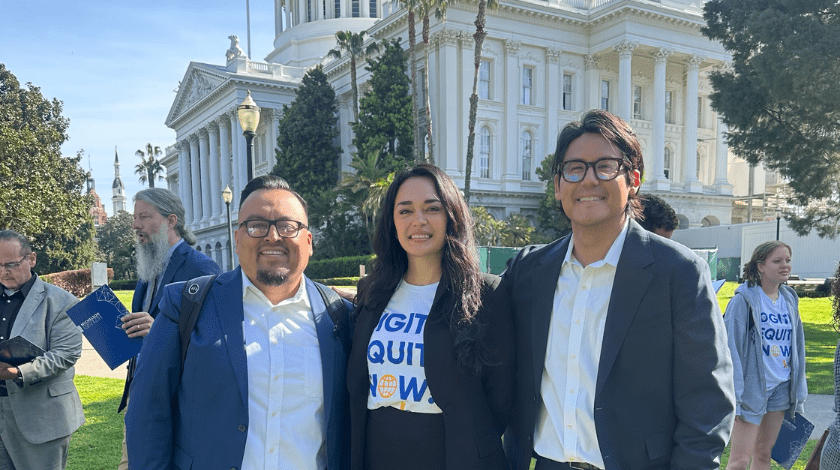Left to right: Michelson 20MM’s Miguel Leon, Cristal Mojica, and Phillip Kim at the second annual digital equity forum in Sacramento
By Cristal Mojica
 Digital equity advocates recently gathered in Sacramento to make their voices heard concerning California’s broadband investments. They uplifted the state’s digital equity priorities; called for increased awareness of and support for recently instituted policies that address digital discrimination; and sought to preserve fairness and equity in broadband infrastructure funding.
Digital equity advocates recently gathered in Sacramento to make their voices heard concerning California’s broadband investments. They uplifted the state’s digital equity priorities; called for increased awareness of and support for recently instituted policies that address digital discrimination; and sought to preserve fairness and equity in broadband infrastructure funding.
The session, “Investing in California’s Broadband Future, A Community Perspective” was hosted by the Michelson 20MM Foundation and Michelson Center for Public Policy. It marked the second annual digital equity policy forum at the state’s capital, in partnership with the California Alliance for Digital Equity.
Opportunities and Limitations of Available Funding for Broadband Infrastructure
The California Community Foundation and #OaklandUndivided opened the conversation by addressing the opportunities and limitations of available funding for broadband infrastructure, including the California Advanced Services Fund (CASF), Federal Funding Account (FFA), and Broadband Equity, Access & Deployment (BEAD) programs. Their presentation underscored the importance of understanding key differences between the short-term and long-term funding, including the levels of oversight and regulation for each program.

As the chart above from the California Public Utilities Commission shows, the amount of funding available in the FAA program ($1.5M) is a once-in-a-generation opportunity for digital equity. This is particularly true when compared against the CASF programs. Due to this, advocates pointed out the critical need for the historic amounts of FFA funding to be equitably allocated to underserved communities.
Three Essential Elements to Close the Divide
The session also emphasized the following as essential to closing the digital divide:
- Process and Transparency: Making pre-construction timelines and priorities for infrastructure broadband public knowledge would result in greater transparency, ensuring funding is equitably allocated.
- Equity Over Expediency: By reframing programmatic goals to remove the focus on expediency, the CDT will foster greater equity since expedience inherently biases those with the fewest barriers.
- Pricing and Terms of Use: To promote better prices and more favorable terms for users, the CDT should collaborate with municipalities, new entrants, independent and non-traditional providers, which will also ensure the network is fully utilized as intended.
The Michelson 20MM Foundation and Michelson Center for Public Policy look forward to continuing to drive awareness and advocate for the equitable distribution and implementation of broadband infrastructure dollars in California’s unserved and underserved communities.
Michelson 20MM is a private, nonprofit foundation working toward equity for underserved and historically underrepresented communities by expanding access to educational and employment opportunities, increasing affordability of educational programs, and ensuring the necessary supports are in place for individuals to thrive. To do so, we work in the following verticals: Digital Equity, Intellectual Property, Smart Justice, Student Basic Needs, and Open Educational Resources (OER). Co-chaired and funded by Alya and Gary Michelson, Michelson 20MM is part of the Michelson Philanthropies network of foundations.
To sign up for our newsletter, click here.
